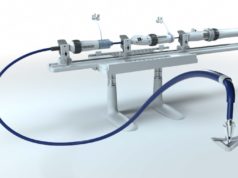
PASCAL’s (Edwards Lifesciences) safety and efficacy may rival that of MitraClip (Abbott) for the treatment of mitral regurgitation (MR), according to data published in JACC: Cardiovascular Interventions.
Fabien Praz, Stephan Windecker (University Hospital Bern, Bern, Switzerland), and Samir Kapadia (Cleveland Clinic, Cleveland, USA) write that the PASCAL repair system “is a welcome addition to the armamentarium of transcatheter mitral valve devices”, although they concede it would be “undue to draw definitive conclusions” from their initial findings.
They analysed 30-day outcome data from their early feasibility study (EFS) on 62 patients from 14 centres, along with previously published findings from a compassionate use (CU) experience in 23 patients, published in the Lancet in 2017 (also Praz et al). Participants included symptomatic patients with primary (26% from CU, 36% EFS) and secondary (52% CU, 55% EFS) mitral regurgitation. Mean age and left ventricular ejection fraction was similar in both groups.
Procedural success was high in the early feasibility study, with MR ≤grade 2+ in 98% of patients. A reduction of MR to ≤grade 1+ was obtained in 86% of the treated patients in the early feasibility study and 77% of those in the compassionate use cohort, a finding, say Praz and colleagues, “that may be explained by the more liberal implantation of two devices in 49% of cases (26% during the CU experience)”. They continue: “Although the placement of two implants occurred more frequently than one would have expected considering the wider implant device, post-procedural mitral stenosis with mean gradient >5mmHg was uncommon.”
The mortality rate was 1.6% in the early feasibility study, and 13% in the compassionate use group, with no strokes in either cohort. Major bleeding occurred in 6.5% of cases in the early feasibility group, compared to 0% among those treated for compassionate use.
Praz et al say that two important questions remain: how PASCAL fits into the treatment options with MitraClip, and how different percutaneous mitral repair and replacement therapies can be integrated in future clinical trials and clinical practice.
The authors point to some of the possible advantages of PASCAL over MitraClip, including wider paddles, the ability to independently grasp leaflets, and the presence of a central spacer. But they caution: “It remains to be seen if more complex anatomies (for example, larger flail segments, large prolapse, cleft, short posterior leaflet) or smaller mitral valve areas (for example, patients with mitral annular calcification) can be preferentially treated with PASCAL.”
Because of differences between the devices in the shape, size, and tension exerted on the leaflets, head-to-head comparison trials are necessary, they say, as well as registries of patients with unique anatomies, to aid clarity. Clinical trials must also incorporate sequential or combined treatments—“even if they are challenging to design”—because they are likely to be used in clinical practice when more than one device becomes available. “The early experience attests to the feasibility of the procedure and further studies will be instrumental to define the appropriate use and indication for this novel device.”
The researchers add: “This is probably the most strategic era for the evolution of percutaneous mitral valve therapies. Interestingly, the … technical characteristics of the PASCAL devices may also be advantageous for the treatment of the regurgitant tricuspid valve that is characterised by thin leaflets and larger coaptation defects.”
Data presented at TVT 2019 (12–15 June, Chicago, USA) also suggest a possible role for the PASCAL system in the management of tricuspid regurgitation. Neil P Fam (Division of Cardiology, St Michael’s Hospital, University of Toronto, Toronto, Canada) outlined a multicentre experience of compassionate use of the PASCAL system for patients with severe tricuspid regurgitation. He concluded that this first-in-human experience of the PASCAL system for tricuspid regurgitation indicated that the system was associated with “high procedural success, acceptable safety and significant clinical improvement in patients with challenging tricuspid anatomy and severe tricuspid regurgitation”.










